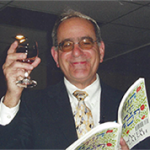There are many reasons some rheumatologists have chosen rural practice over working in urban settings. For some, it was a chance for both physician spouses to be in the same practice area. For others, the draw was the lifestyle—a much slower pace than in the cities.
“When I left my fellowship in the 1970s, it was the lifestyle and geography that brought me to rural Maine,” says Sidney Block, MD, a private practice rheumatologist with Block and Gratwick, PA, in Bangor, Maine. “Leaving New York City, my wife and I had the opportunity to work in a city and visit the country or live in the country and visit the city. To best raise our children, we opted for the latter and have never regretted the choice.”
Surroundings Important
The surroundings are another amenity that brings many to practice off the more highly traveled paths.
“Coming to Minocqua … was a perfect combination for me,” noted Martina Ziegenbein, MD, who works in a group practice at the Marshfield Clinic office in Minocqua, WI. “I had visited the area while doing my residency in Marshfield and loved the nature and the surroundings.”
Another reason she picked a rural area was to get a J-1 visa waiver. However, even though her service time expired two years ago and she could go anywhere in the United States, she has stayed in Minocqua.
There is a whole different feel to practicing medicine outside of the city. More collegial, even with my patients.
—Karen Kolba, MD
Patients Bring Satisfaction
The patients themselves bring a lot of satisfaction to the practice of rheumatology in rural areas. The physicians see an independent pride in their patients. For example, Dr. Block points to their desire to make sure he gets some sort of value for his time.
“One of the joys of rural practice is the patient population I care for,” he continued. “My patients come to work with me, not challenge me. They are a strong-mannered and feisty lot, and they have had to be, living in one of the poorest areas of the United States. The occasional bag of potatoes or pot of lobster left in the office attests to their pride.”
In the country, you are also more likely to see your patients in social situations. The doctors all agree that patients usually keep the medical concerns in the office and do not often intrude when the physician is seen out and about.
“In a town of 30,000, it is almost a daily occurrence to see a patient in the bank or at the hardware store,” says G. Radford Moeller, MD, in private practice at CarolinaEast Internal Medicine in New Bern, N.C. “I have found that to be a big positive, for the most part. Most of the secondary gains we get from any private practice are the feedback from our patients.”
Social expectations are often different than those thought of as common in the city. For example, the taboo against treating one’s friends goes quickly by the wayside.
“In New York, I had heeded the advice that a physician should not treat his friends, for a number of what, at the time, seemed valid reasons,” says Dr. Block. “But one of the first patients who came to my office admonished me, ‘What do you mean you can’t treat me because I am your friend? You damn well better treat me because I am your friend!’”
A person thinking about working outside the city needs to understand exactly what ‘rural’ means. There will be fewer amenities, less shopping, but a more serene atmosphere.
—Martina Ziegenbein, MD
Marriage Considerations
For at least some physicians, marital bliss is another perk of working in rural areas. Dr. Moeller noted that one of the reasons he took his position in North Carolina was because the opportunities for couples who were both physicians were slim elsewhere. Both he and his gastroenterologist wife were offered jobs in New Bern.
There was another reason, too.
“We decided we wanted to focus on a smaller town after noting that many of our doctor–doctor couple friends who went to higher-pressure urban institutions did not stay married for too long,” says Dr. Moeller. “The ones still married are those who gave up the bright lights and wearing the six hats required of a professor when I came out of my residency at Duke 30 years ago. I have had a satisfying career, raised four kids, and remained married. At the end of the day, you can’t do much better than that.”
There is also a continuity of practice that you may not see in the city. It is not unusual to have treated multiple generations of the same family. This allows the rheumatologist to know the genetic predispositions and, to a certain extent, the medical peculiarities of the family. It also means a level of trust in the physician that can only be gained by years and years of experience.
Professional Interactions Can Be Scarce
While a less hurried pace and great scenery is a good thing, one of the minuses cited by rural practitioners is a lack of professional interaction with peers. This can be especially daunting when a newly minted physician begins his or her first practice.
“I was the only rheumatologist for about 15 counties when I started in private practice,” says Dr. Moeller. “It is certainly easier to leave a fellowship if you have four or five senior partners down the hall you can look to for advice. It took the better part of three years before I was able to feel completely comfortable in my role as the only rheumatologist for miles around.”
At the time, the major resource available to rural physicians was the telephone and contacts made during residency and fellowships. All those interviewed for this article noted the great help and comfort it was to have their professors and mentors in the urban areas at the other end of a telephone.
Karen Kolba, MD, is a rheumatologist in a solo practice in Santa Maria, Calif. She found that being active in the ACR was one way to lessen the isolation.
“I took refuge in the ACR,” she says. “Committees and leadership positions were a way to stay in touch with the outside world. I also went to the annual meeting and some of the smaller ones to stay connected.”
Most of the rheumatologists who made the switch to rural settings also missed the luxury of having large medical libraries to fall back on. Dr. Kolba noted that she probably subscribed to more specialty journals at her office than were available at local hospitals.
What I worry about the most these days is what is going to happen to patients if I become ill or have to retire.
—Sidney Block, MD
Internet Bringing Changes
However, many of these concerns have changed over the years because of the availability of the Internet. Websites such as UpToDate.com give easy access to the latest research and experts in many fields. The availability of journals and even remote access to databases has opened up the equivalent of a medical library on the desktop. E-mail that can be answered at a person’s convenience has replaced phone tag when one practitioner wants to bounce something off of another.
Dr. Ziegenbein noted that interactions with her colleagues at Marshfield have always been an important aspect of her practice, independent of the mode used. However, she finds video conferencing especially exciting because it allows her to still become involved in debating clinical options in complex cases.
All four physicians agree that working in a rural environment is not for everyone.
Understanding What “Rural” Means
“A person thinking about working outside the city needs to understand exactly what ‘rural’ means,” says Dr. Ziegenbein. “There will be fewer amenities, less shopping, but a more serene atmosphere.”
It is likely that there will be fewer cultural options nearby. You may have to drive to the nearest city to see plays or concerts or to go to fancy restaurants.
There are also practice-related concerns that may be harder to address. One of them is finding, and then keeping, a partner. Urban areas have a much wider selection of physicians from which to choose.
Unless a spouse is a physician or can run his or her own business, employment opportunities are often scarce. Physicians in rural areas often have to train their own support staff.
In some cases, the hours worked can be a deal breaker.
“The reason I am the only rheumatologist in my practice is not for lack of trying to find a partner,” says Dr. Moeller. “At least six times I got close to finding a partner only to have it fail at the last minute because they did not want to put in the 60- to 80-hour weeks that are often needed. It takes a certain type of person to accept the responsibility that goes with being the only specialist caring for 30,000 people over an area of hundreds of square miles.”
However, this tends to be situation specific. Dr. Ziegenbein’s practice with a large multispecialty group alleviates much of the time pressures, as hospitalists and internists cover time away from the office.
“The important thing to think about when looking at professional opportunities is to sit down and be honest with yourself about what makes you smile at the end of the day,” says Dr. Moeller. “I get a real joy out of caring for patients, and the rural setting made that easy and fulfilling.”
Concerns for Future
The physicians that are nearing retirement age have concerns about the longer-term viability of rural practice. They see younger physicians leaving school with large loan debt that makes it harder, if not impossible, to set up a private practice. They also see a generational shift in priorities, with the family and other interests becoming more important than professional pursuits. Both of these may move new doctors to go with group practices in more populated areas.
“What I worry about the most these days is what is going to happen to patients if I become ill or have to retire,” says Dr. Block.
Despite differences in age, location, and type of practice, all four physicians were in complete agreement about one thing. They would still practice in a rural setting if they had it to do over again.
“There is a whole different feel to practicing medicine outside of the city,” says Dr. Kolba. “More collegial, even with my patients. While I enjoy visiting and traveling to big cities, I am always ready to come back to the calm and quiet.”
Kurt Ullman is a freelance writer based in Indiana.





